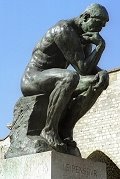It is the same in the case of girls. I am often solemnly asked what I think of the new ideas about female education. But there are no new ideas about female education. There is not, there never has been, even the vestige of a new idea. All the educational reformers did was to ask what was being done to boys and then go and do it to girls; just as they asked what was being taught to young squires and then taught it to young chimney sweeps. What they call new ideas are very old ideas in the wrong place. Boys play football, why shouldn't girls play football; boys have school colors, why shouldn't girls have school-colors; boys go in hundreds to day-schools, why shouldn't girls go in hundreds to day-schools; boys go to Oxford, why shouldn't girls go to Oxford--in short, boys grow mustaches, why shouldn't girls grow mustaches--that is about their notion of a new idea. There is no brain-work in the thing at all; no root query of what sex is, of whether it alters this or that, and why, anymore than there is any imaginative grip of the humor and heart of the populace in the popular education. There is nothing but plodding, elaborate, elephantine imitation. And just as in the case of elementary teaching, the cases are of a cold and reckless inappropriateness. Even a savage could see that bodily things, at least, which are good for a man are very likely to be bad for a woman. Yet there is no boy's game, however brutal, which these mild lunatics have not promoted among girls. To take a stronger case, they give girls very heavy home-work; never reflecting that all girls have home-work already in their homes. It is all a part of the same silly subjugation; there must be a hard stick-up collar round the neck of a woman, because it is already a nuisance round the neck of a man. Though a Saxon serf, if he wore that collar of cardboard, would ask for his collar of brass.
It will then be answered, not without a sneer, "And what would you prefer? Would you go back to the elegant early Victorian female, with ringlets and smelling-bottle, doing a little in water colors, dabbling a little in Italian, playing a little on the harp, writing in vulgar albums and painting on senseless screens? Do you prefer that?" To which I answer, "Emphatically, yes." I solidly prefer it to the new female education, for this reason, that I can see in it an intellectual design, while there is none in the other. I am by no means sure that even in point of practical fact that [the] elegant female would not have been more than a match for most of the inelegant females. I fancy Jane Austen was stronger, sharper and shrewder than Charlotte Bronte; I am quite certain she was stronger, sharper and shrewder than George Eliot. She could do one thing neither of them could do: she could coolly and sensibly describe a man. I am not sure that the old great lady who could only smatter Italian was not more vigorous than the new great lady who can only stammer American; nor am I certain that the bygone duchesses who were scarcely successful when they painted Melrose Abbey, were so much more weak-minded than the modern duchesses who paint only their own faces, and are bad at that. But that is not the point. What was the theory, what was the idea, in their old, weak water-colors and their shaky Italian? The idea was the same which in a ruder rank expressed itself in home-made wines and hereditary recipes; and which still, in a thousand unexpected ways, can be found clinging to the women of the poor. It was the idea I urged in the second part of this book: that the world must keep one great amateur, lest we all become artists and perish. Somebody must renounce all specialist conquests, that she may conquer all the conquerors. That she may be a queen of life, she must not be a private soldier in it. I do not think the elegant female with her bad Italian was a perfect product, any more than I think the slum woman talking gin and funerals is a perfect product; alas! there are few perfect products. But they come from a comprehensible idea; and the new woman comes from nothing and nowhere. It is right to have an ideal, it is right to have the right ideal, and these two have the right ideal. The slum mother with her funerals is the degenerate daughter of Antigone, the obstinate priestess of the household gods. The lady talking bad Italian was the decayed tenth cousin of Portia, the great and golden Italian lady, the Renascence amateur of life, who could be a barrister because she could be anything. Sunken and neglected in the sea of modern monotony and imitation, the types hold tightly to their original truths. Antigone, ugly, dirty and often drunken, will still bury her father. The elegant female, vapid and fading away to nothing, still feels faintly the fundamental difference between herself and her husband: that he must be Something in the City, that she may be everything in the country.
There was a time when you and I and all of us were all very close to God; so that even now the color of a pebble (or a paint), the smell of a flower (or a firework), comes to our hearts with a kind of authority and certainty; as if they were fragments of a muddled message, or features of a forgotten face. To pour that fiery simplicity upon the whole of life is the only real aim of education; and closest to the child comes the woman--she understands. To say what she understands is beyond me; save only this, that it is not a solemnity. Rather it is a towering levity, an uproarious amateurishness of the universe, such as we felt when we were little, and would as soon sing as garden, as soon paint as run. To smatter the tongues of men and angels, to dabble in the dreadful sciences, to juggle with pillars and pyramids and toss up the planets like balls, this is that inner audacity and indifference which the human soul, like a conjurer catching oranges, must keep up forever. This is that insanely frivolous thing we call sanity. And the elegant female, drooping her ringlets over her water-colors, knew it and acted on it. She was juggling with frantic and flaming suns. She was maintaining the bold equilibrium of inferiorities which is the most mysterious of superiorities and perhaps the most unattainable. She was maintaining the prime truth of woman, the universal mother: that if a thing is worth doing, it is worth doing badly.
Previous G.K. Chesterton Index Next
Search This Blog
The Jiggly Room
Polk High
The Encyclopedia Marxofeminist

Feminist "Equality" Includes The Loss of Free Speech
Sheeple Fighting Back!
- Black Sheep - You Tube (2min)
- Symantec (SYMC - NASDAQ) Downgraded to "Sell"
- Problems With Norton Internet Security?
- Cypress CEO Responds to Nun's Urging a "Politically Correct" Board Make-Up
- Do You Believe Women Have the Right to Free Speech?
- Canadian Feminists Getting Worried?
- Seven Ways To Get Traffic Without Google
Not All Women Are Like That! (NAWALT)
Myths, Legends & Religions

You are not god. Learn to observe without judging.

- Cypress CEO Responds to Nun's Urging a 'Politically Correct' Board Make-up
- The Baby Bomb: How the Boomers were Used to Demolish a Culture
- Statement of Bill Wood to the Committee on Ways and Means
- Why Did Feminists Attack the Family? -- by Heretical Sex
- Political Correctness - The Revenge of Marxism -- by Baron Bodissey
- Are Americans Practicing Communism? (The Ten Planks of the Communist Manifesto)
"We can't expect the American People to jump from Capitalism to Communism, but we can assist their elected leaders in giving them small doses of Socialism, until they awaken one day to find that they have Communism." -- Nikita Krushchev

THE ANIMAL FARM REALITY OF "FEMINIST EQUALITY:"
"Differences [between men and women], including the products of social inequality, MAKE UNEQUAL TREATMENT NOT UNEQUAL AT ALL." -- Catharine MacKinnon, "Reflections on Sex Equality Under Law," Yale Law Journal, 1991
Blog Archive
-
▼
2003
(151)
-
▼
January
(150)
- The Woman Question -- by Stephen Leacock (1916)
- Woman's Fickleness -- The Folk-Lore of Women -- by...
- Local Allusions to Women -- The Folk-Lore of Women...
- Red Haired Girls -- The Folk-Lore of Women -- by T...
- Woman's Secrets -- The Folk-Lore of Women -- by T....
- Love Tests -- The Folk-Lore of Women -- by T.F. Th...
- Woman's Hate -- The Folk-Lore of Women -- T.F. Thi...
- Woman's Love -- The Folk-Lore of Women -- T.F. Thi...
- Bad Women -- The Folk-Lore of Women -- T.F. Thiste...
- Woman's Goodness -- The Folk-Lore of Women -- by T...
- Woman's Tongue -- Folk-lore of Women -- by T.F. Th...
- Woman's Eyes -- The Folk-lore of Women -- T.F. Thi...
- Woman's Dress -- The Folk-lore of Women -- by T.F....
- Woman's Beauty -- The Folk-lore of Women -- by T.F...
- Woman's Characteristics -- Folk-lore of Women -- b...
- Preface, The Folk-Lore of Women -- by T.F. Thistel...
- Folklore of Women -- by T.F. Thistelton-Dyer (1906)
- I. On Female Suffrage -- by G.K. Chesterton
- XIV. Folly and Female Education -- by G.K. Chesterton
- V. An Evil Cry -- by G.K. Chesterton
- XII. The Modern Slave -- by G.K. Chesterton
- XI. The Queen and the Suffragettes
- X. The Higher Anarchy -- by G.K. Chesterton
- IX. Sincerity and the Gallows -- by G.K. Chesterton
- VIII. The Brand of the Fleur-de-lis -- by G.K. Che...
- VII. The Modern Surrender of Woman
- VI. The Pedant and the Savage - by G.K. Chesterton
- V. The Coldness of Chloe -- by G.K. Chesterton
- IV. The Romance of Thrift -- by G.K. Chesterton
- III. The Emancipation of Domesticity -- by G.K. Ch...
- II. The Universal Stick -- by G.K. Chesterton
- I. The Unmilitary Suffragette -- by G.K. Chesterton
- III The Common Vision -- by G.K. Chesterton
- II Wisdom And The Weather -- by G.K. Chesterton
- Part One: The Homelessness of Man -- by G.K. Chest...
- What's Wrong With The World -- by G.K. Chesterton ...
- (From) Principles of Psychology -- by William James
- (From) New Introductory Lectures on Psycho-Analysi...
- Need It Be So? - by Leo Tolstoy (1900)
- Virginibus Puerisque - Chapter One - By Robert Lou...
- The Intimate Journal of Henri Amiel: August 8, 1876
- The Intimate Journal of Henri Amiel: May 21, 1868
- A Collection of Writings on Women -- Freiderich Ne...
- The Intimate Journal of Henri Amiel: April 26, 1868
- The Intimate Journal of Henri Amiel: September 17,...
- The Intimate Journal of Henri Amiel: March 25, 1878
- The Intimate Journal of Henri Amiel: March 24, 1878
- The Intimate Journal of Henri Amiel: February 1, 1876
- The Intimate Journal of Henri Amiel: February 15, ...
- The Intimate Journal of Henri Amiel: April 2, 1873
- The Intimate Journal of Henri Amiel: February 16, ...
- The Intimate Journal of Henri Amiel: May 6, 1852
- The Intimate Journal of Henri Amiel: May 3, 1852
- The Intimate Journal of Henri Amiel: April 3, 1873
- The Intimate Journal of Henri Amiel: December 11, ...
- The Intimate Journal of Henri Amiel: April 1, 1870
- The Intimate Journal of Henri Amiel: May 13, 1869
- The Intimate Journal of Henri Amiel: December 26, ...
- The Intimate Journal of Henri Amiel - March 17, 1868
- The Intimate Journal of Henri Amiel (selections)
- Woman/Man -- From Kierkegaard's Journals
- On Women - by Arthur Schopenhauer, 1851
- IN VINO VERITAS (or THE BANQUET) -- by Soren Kierk...
- The Metaphysics of the Love of the Sexes - by Arth...
- Democracy in America, Vol. 2, Ch. XII, "How The Am...
- A Bachelor's Complaint of the Behaviour of Married...
- Tom Pry's Wife -- by Charles Lamb (1775-1834)
- Thomas Jefferson - The Aristocracy of Beauty
- Thomas Jefferson - Random Remarks as a Young Man
- Thomas Jefferson - A Bill for Proportioning Crimes...
- Thomas Jefferson - On Mrs. Merry [Wife of British ...
- Thomas Jefferson - On Marie Antoinette
- Thomas Jefferson - Religion and The University
- Thomas Jefferson - Commerce, War, and Revolution
- Thomas Jefferson - Amazons and Angels
- Thomas Jefferson - On European Education
- Thomas Jefferson (selections)
- Letter to His Son (excerpt) -- by Lord Chesterfiel...
- The Spirit of Laws - Book XXVII
- The Spirit of Laws - Book XIX
- The Spirit of Laws - Book XVII
- The Spirit of Laws - Book XVI
- The Spirit of Laws - Book VII
- The Spirit of Laws (excerpts) -- Baron de Montesqu...
- Man Superior to Woman - Conclusion
- Man Superior to Woman - Chapter Six
- Man Superior to Woman - Chapter Five
- Man Superior to Woman - Chapter Four
- Man Superior to Woman - Chapter Three
- Man Superior to Woman - Chapter Two
- Man Superior to Woman - Chapter One
- Man Superior to Woman - Introduction
- Man Superior to Woman - Dedication to the Ladies
- Man Superior to Woman -- by A Gentleman, 1739
- Memoirs Of Louis XIV And The Regency, Vol. III, Ch...
- "The Man-Woman" -- Hic Mulier, 1620
- The Fifteen Joys of Marriage (first two "joys") --...
- Termination of the Female Sex - Mathieu of Boulogne
- Monstrous Woman - Mathieu of Boulogne
- Mother of Calamity - Mathieu of Boulogne
-
▼
January
(150)

"Only an armed people can be the real bulwark of popular liberty." -- V.I. Lenin
Repeal the Canadian Gun Registry

"A system of licensing and registration is the perfect device to deny gun ownership to the bourgeoisie." -- V.I. Lenin
"We shall destroy you from within!" -- Nikita Krushchev, during the Kitchen Debate, 1959
"Self Made Man" - Sculpture by Bobbie Carlyle
Websites
The Demographic Trap

"Destroy the family, you destroy the country." -- V.I. Lenin
"America is like a healthy body and its resistance is threefold: its patriotism, its morality, and its spiritual life. If we can undermine these three areas, America will collapse from within." -- Josef Stalin
Back to the Bible
A Non-Bible Thumper Point of View
"The aim of socialism is not only to abolish the present division of mankind into smaller states and all-national isolation, not only to bring the nations closer to each other, but also to merge them." -- V.I. Lenin
No Thanks - We'd Rather Be Canadian!
Man-Made Global Warming is a Hoax being used to bring about Global Communism (Globalization)

"Every collectivist revolution rides in on a Trojan horse of 'emergency'. It was the tactic of Lenin, Hitler, and Mussolini. In the collectivist sweep over a dozen minor countries of Europe, it was the cry of men striving to get on horseback. And 'emergency' became the justification of the subsequent steps. This technique of creating emergency is the greatest achievement that demagoguery attains." -- Herbert Hoover
Beware the Cultural Marxism of Environmentalists
"The threat of environmental crisis will be the 'international disaster key' that will unlock the New World Order." -- Mikhail Gorbachev, quoted in "A Special Report: The Wildlands Project Unleashes Its War On Mankind", by Marilyn Brannan, Associate Editor, Monetary & Economic Review, 1996, p. 5

ABOLISH THE UNITED NATIONS
The Marxism of Multi-Culturalism

"Tolerance is how far a mechanical part can deviate from the norm before it screws up the entire machine." -- Any Mechanic
The Grinch That Steals Children's Souls

"Give us the child for 8 years and it will be Bolshevik forever." -- V.I. Lenin
"We must declare openly what is concealed, namely, the political function of the school...It is to construct communist society." -- V.I. Lenin
Extra, Extra!



"The oppressed are allowed once every few years to decide which particular representatives of the oppressing class are to represent them." -- Karl Marx
The Liberal Party of Canada = Cultural Marxist Agenda
- The Real Pierre Trudeau: Father of Canada's Permissive Society -- by Steve Jalsevac
- Pierre Elliot Trudeau - Cultural Marxist Wrapped In a Canadian Flag
- The Multi-Tasking Pink Proletariat
- The Right Dishonourable Paul Martin Wants Canadians to "Give Up A Little Of Our Sovereignty To Make The World Work." -- YouTube 2:38 (Maybe We Should Lock Him Up To Make Canada Work!)
Congratulations, Karl Marx!

Marxism Links (For Researching)

- A Brief Overview of Marxism: "Communist (Community) Oriented Policing" - by Phil Worts
- Antonio Gramsci - Collected Works, including the Prison Notebooks
- Antonio Gramsci's Life & His Marxist Theories Explained
- Communist Manifesto - by Karl Marx & Frederick Engels
- Herbert Marcuse Official Homepage
- Herbert Marcuse, Haters of
- Marxists Internet Archive
- The Conflict Tradition
- Women and Marxism
Rule by Science

Philosophy Corner

“Dialectical thought is related to vulgar thinking in the same way that a motion picture is related to a still photograph. The motion picture does not outlaw the still photograph but combines a series of them according to the laws of motion.” -- Leon Trotsky
Dialectical Thought is a Cornerstone of Marxism, and Feminism (Because They Are One In the Same)
The Marxist Dialectic's Zig-Zag

Wishing to advance in a room full of people, I do not walk through the aisle and straight toward my goal. Nor do I move slowly through the crowd shaking hands with friends and acquaintences, discussing points of interest, gradually nearing the objective. The dialectical pathway is different. It consists of a resolute forward advance followed by an abrubt turn and retreat. Having retreated a distance there is another turn and advance. Through a series of forwardbackward steps the goal is approached. To advance thus is to advance dialectically. The Communist goal is fixed and changeless, but their direction of advance reverses itself from time to time. They approach their goal by going directly away from it a considerable portion of the time. Lenin wrote the textbook, One Step Forward, Two Steps Back. Chinese Communist schoolchildren are taught to do the dialectical march taking three steps forward and two steps back. If we judge where the Communists are going by the direction in which they are moving we will obviously be deceived -- Dr. Fred Schwarz, President of Christian Anti-Communism Crusade
Critical Theory

All's Fair In Love and War


The Matriarchy Lives! (Click Picture)

"I am most anxious to enlist everyone who can speak or write to join in checking this mad, wicked folly of 'Women's Rights', with all its attendant horrors, on which her poor feeble sex is bent, forgetting every sense of womanly feelings and propriety. Feminists ought to get a good whipping. Were woman to 'unsex' themselves by claiming equality with men, they would become the most hateful, heathen and disgusting of beings, and would surely perish without male protection." -- Queen Victoria, 1870


Please Give Manginas the Respect They Deserve: NONE!

























